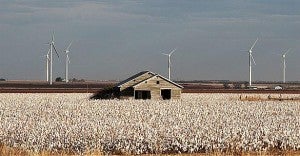This week, the Texas Senate will likely debate House Bill (HB) 3390, introduced by Representative Harvey Hilderbran and sponsored by Senator Bob Deuell. This bill, which passed in the House and out of the Economic Development Senate Committee on May 14th, reauthorizes Chapter 313 of the Texas Tax Code – commonly known as the Texas Economic Development Act. Chapter 313 is an economic development program that allows companies to apply for a temporary reduction in property taxes in exchange for a major capital investment commitment.
Chapter 313 has helped put Texans to work and grow rural economies. Wind energy is among the industries that take advantage of this program and, in the process, has attracted around $24 billion in wind energy investments to 56 counties throughout the lone star state – $15 billion of which was a direct result of Chapter 313. Wind energy projects create new jobs and employ meteorologists, surveyors, structural engineers, assembly workers, electrical workers, construction workers, lawyers, bankers, technicians and local service jobs associated with increased growth.
However, Chapter 313 is set to expire in 2014. If the Texas Senate does not renew this crucial bill as is (with renewable energy projects included), then the state stands to lose its competitive advantage in attracting wind and solar development to the state – potentially losing projects to the 34 other states offering clean energy incentives. Some states don’t impose a property tax on wind projects at all.
Furthermore, including renewables in Chapter 313 helps growing school districts’ tax bases, which benefit from the substantial investment that wind energy projects bring to their communities. The expected 30+ year life span of these projects makes them lucrative municipal assets. Additionally, landowners in rural Texas receive lease payments for each turbine installed on their property. These infusions of capital help farmers and ranchers support their land, particularly during times of extreme drought. 95 percent of land used for wind turbines can still be used for agricultural purposes, allowing farmers and ranchers to benefit from a second harvest – of wind.
Another aspect unique to wind and solar projects is their long, durable life spans. One of the rules of Chapter 313 requires companies who are developing projects to stay in the communities for three years following the limitation period, meaning the life of the contract. Unlike some other types of development, wind energy and large-scale solar projects are committed for the long haul. The upfront investment is substantial and the large wind turbines and ground-mounted solar arrays are not easy to move. For taxpayers in Texas, this guarantees long-term benefits for both the state and local communities.
Opponents to clean energy’s continued inclusion in Chapter 313 have attacked the number of jobs created by the industry. The program reports are misleadingly low because they only count direct jobs created by the participating companies – whereas large-scale wind and solar projects also create indirect jobs from contracted construction, maintenance and operations. Because they can’t meet Chapter 313’s direct job creation requirement, wind and solar companies typically seek a waiver from the job creation requirement, which local school boards approve. Now, critics want to move control of these waivers to the Comptroller’s office, and out of local control. This move concerns those who may be wary of potential political agendas of state agencies in Texas.
While improvement to this waiver process is welcomed, with even the Wind Coalition stating that they support “other changes that would add some state oversight to ensure taxpayers are getting a good deal and that the program is incentivizing projects that would not come to Texas otherwise,” we are concerned that these attacks by critics are designed to unfairly target wind for exclusion by anti-renewable groups with an ideological motive.
Renewable energy needs to remain, as it currently reads, in Chapter 313 with local control maintained when job waivers are considered. As Chapter 313 is reviewed, we encourage Texas Senators to support clean energy – which is spurring economic development, creating jobs and helping Texas further its leadership position in the multi-trillion dollar clean energy economy.











2 Comments
Many thanks for this valuable information about legislation and wind production! Good to know. I think that it’s right to offer landowners in rural Texas lease payments for each turbine installed on their property. And I fully agree that these infusions of capital help farmers and ranchers support their land and pay their property taxes.
Lieutenant Governor David Dewhurst is proposing removing renewable energy from the Chapter 313 program. If you support wind/solar energy development in Texas, please act today by calling your State Senator, Governor Rick Perry, and Lieutenant Governor Dewhurst. Tell them to keep wind viable as an water-free, zero-emission energy source and a terrific economic development tool for rural Texas. Contact information available at http://www.capitol.state.tx.us.